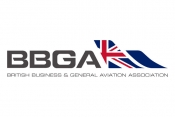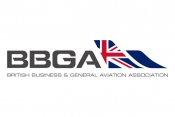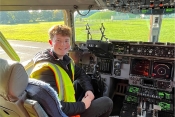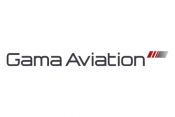BBGA helps the next generation enter the aviation workplace
Monday 28th October 2024
The British Business General Aviation Association (BBGA) actively engages with young people to help inspire the next generation of aviation professionals. It is involved in various initiatives aimed at promoting careers in aviation, highlighted in its #BizavEnables social media campaign; including through its collaboration with Stansted Airport College and its support of the Aviation Skills Recruitment Platform (ASRP)/TalentView Aviation (TVA).
The ASRP platform has been created to support jobs, skills and training within the UK Aviation industry. While ASRP is designed to help more experienced candidates looking for employment in aviation, its sister platform, TalentView Aviation, is a launch pad for individuals looking for their first job and other entry level opportunities.
Richard Smith, Director, ASRP, comments: “On average we have 1,000 early roles – post graduate roles, internships, placements and apprenticeship opportunities in the UK on our system during peak recruitment season from September to January.
Currently, ASRP/TalentView is showing 361 entry level roles from graduate engineering programmes and air traffic control traineeships to Royal Air Force apprenticeships and ramp service roles and over 600 opportunities for more experienced hires.”
ASRP https://trs-system.co.uk/
BBGA advocates apprenticeships
Apprenticeships are advocated by BBGA as a fantastic way to enter the workplace, learn practical skills, gain experience and get paid.
The Association is pleased to highlight the progress of one young man, Owen Reynolds, a 20-year-old apprentice, who recently graduated from BBGA member, Gama Aviation’s apprenticeship programme and is now a fully qualified Operations Controller.
This is Owen’s story so far.
How did you first learn about the apprenticeship programme for flight ops controllers, and what motivated you to apply?
I saw the apprenticeship advertised on the government website. The chance to work at Farnborough Airport perfectly aligned with my interests and career goals.
Can you describe what your day-to-day experiences were like during the apprenticeship?
I gained valuable skills that I believe are applicable in any role within the aviation industry. A typical day as an Ops Controller is varied and entails: Flight and weather watch; ground operations administrative tasks; daily tasks and priorities; Ops systems; flight planning; air ambulance operations procedures and utilisation of myairops software systems and trip support. I passed the apprenticeship after completing exams, observations, and coursework.
Were there any specific challenges you faced during your training, and how did you overcome them?
Adapting to 12-hour shifts and working in an office environment for the first time was challenging but colleagues were extremely understanding and helpful throughout.
How did the structured training and mentorship contribute to your growth and development in the field of flight operations?
Regular meetings and progress reviews helped me understand my achievements and the next steps to further my abilities in the workplace. The programme's comprehensive training, hands-on experience, and direct pathway to an Operations Controller position made it both enjoyable and valuable.
What advice would you give to those who are considering a similar career path or an apprenticeship in aviation?
I would certainly recommend considering an apprenticeship in aviation. Hands-on experience and performing the controller role in a supported environment have been insightful, helped me gain confidence and many other skills.
In your opinion, why is it important for companies to encourage and support young talent to pursue careers in the aviation industry?
After visiting different airlines and going on residentials with other apprentices, I gained a huge insight into how popular this industry is among young people. It’s great to see so many young adults pursuing a career in aviation.
Looking ahead, what are your aspirations and goals within the aviation field? How do you see your role evolving over time?
I hope to keep progressing my career with this company and am excited about what the future holds. The diverse sectors of the business offer opportunities for career development and possibilities across the globe.
Sean Ramsay, Head of Ground Operations Services, Gama Aviation, comments: “These young apprentices represent the future of our industry, and we couldn’t be more excited to see their growth and potential. At Gama Aviation, we believe in equipping the next generation with the skills and experience they need to thrive in aviation. Their fresh perspectives, combined with the solid foundation we provide, will play a crucial role in shaping the future of operations in aviation.”
Paul Cremer, Head of Aviation Delivery, Gama Aviation, adds: “At Gama Aviation, we are incredibly proud of the apprenticeship programme we run in conjunction with Crosby Training for Operations Controllers, which has been a great success so far. As a result of this, we are pleased to announce we are adding two new apprentices to our team. Investing in the next generation is essential for the future of our industry, and our programme provides the foundation for a long, rewarding career in aviation. With the rapid evolution of new technologies in aviation, this sector is more exciting than ever, and we are committed to nurturing the talent that will drive its future.”

BBGA advocates the apprentice
route that Gama Aviation’s
Owen Reynolds took.
About BBGA
BBGA is the UK’s national trade body representing business and general aviation. Formerly known as GAMTA and founded in 1970, its member companies span all facets of the business aviation sector. BBGA represents nearly 200 companies, including airports, corporate flight departments, operators, aviation services organisations and aircraft manufacturers.
Latest News

Wednesday 19th February 2025
ACIA Aero Leasing places ATR72-500 Bulk Freighter with Canada’s KF Aerospace

Wednesday 19th February 2025
Serious consequences for charters operating without a valid UK Foreign Carrier Permit, warns BBGA








Get Social
Twitter Linked in Facebook Instagram